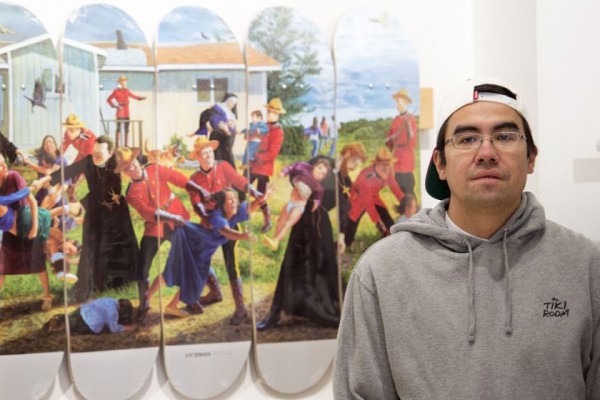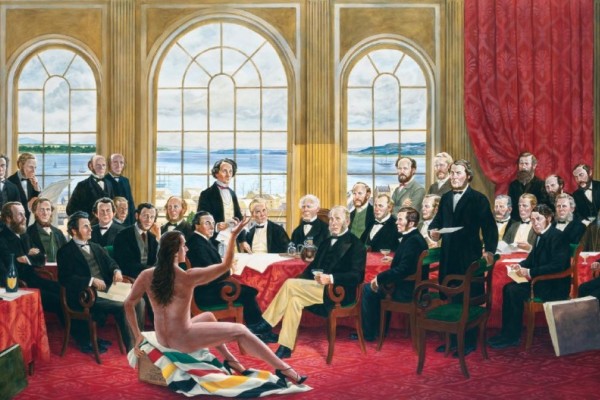-

Trudeau called on to stop land fraud as Kanehsatake hunger strike ends
In a press release, the Kanien’kehá:ka of Kanehsatà:ke renewed their call for justice, inviting Trudeau to meet and negotiate an end to the land dispute, which has been going on for 302 years too long. Canadian Dimension stands with the Kanien’kéha:ka (Mohawk) of Kanehsatà:ke and proudly publishes their full press release.
-

All eyes on Kanehsatake: What you need to know about the hunger strike to stop colonial land fraud
Trudeau was elected, in part, on a platform of reconciliation with Indigenous peoples. Though apologies and financial compensation are important steps in the right direction, meaningful reconciliation in Canada also requires the return of stolen land. Canadians, and the world, must pay close attention to the situation in Kanehsatà:ke to ensure that 2019 ends with negotiated peace and justice and not more conflict and bloodshed.
-

Kanesatake resident begins hunger strike to protest ongoing colonial land fraud
Earlier this summer, Sean Carleton sat down with Ellen Gabriel to talk about the recent developments Kanehsatà:ke. Canadian Dimension stands with the Kanien’kéha:ka (Mohawk) of Kanehsatà:ke and proudly publishes their full press release about the hunger strike to protest ongoing colonial land fraud.
-
Trudeau refuses to stop land fraud: Press release of the Mohawks of Kanehsatake
Earlier this summer, Sean Carleton sat down with Ellen Gabriel to talk about the recent developments Kanehsatà:ke. As of 29 August, Trudeau is refusing to meet with the Mohawks and declare a temporary moratorium on development so that a peaceful resolution to ongoing tensions can be negotiated. This is unacceptable. CD stands with the Kanien’kéha:ka (Mohawk) of Kanehsatà:ke and proudly publishes their most recent press release.
-
Canada must stop land fraud: Press release of the Mohawks of Kanesatake
On 21 August 2019, Ellen Gabriel and other Kanien’kéha:ka held a press conference in the Pines, the site of the so-called “Oka Crisis”, to address the ongoing land fraud in their homelands. They are giving Justin Trudeau and the Government of Canada 10 days to intervene in the 300-year long land dispute and to stop all illegal development in Kanehsatà:ke.
-

‘This is our land’: An interview with Ellen Gabriel about ongoing land fraud at Kanesatake
For the Kanien’kéha:ka (Mohawk) of Kanehsatà:ke, the return of stolen land – fraudulently sold first by a religious order and then by the municipality of Oka, Quebec and the Government of Canada – has been at the heart of their demands for 300 years. Mohawk resistance to the ongoing theft of Kanien’kéha:ka homelands is well-known. Most notably, in the summer of 1990, during the so-called “Oka Crisis,” Mohawks defended a forested area known as the Pines from development.
-
The legacy of ‘Oka’ and the future of Indigenous resistance
Though many Canadians saw the events of that summer as a “crisis,” to the Mohawks, “Oka” was just the most recent event in an almost 300-year struggle to protect their land from colonial and capitalist development. With the 30th anniversary of Oka on the horizon, CD’s Sean Carleton sat down with Ellen Gabriel to discuss the legacy of Oka and the future of Indigenous resistance.
-

Thrashing colonialism: Skateboarding, history, and the power of education
In 2015, Micheal Langan created Colonialism Skateboards, an independent company that makes skateboard decks, to highlight Indigenous people’s perspectives, history, and culture. He has released nine graphics to date, covering a range of issues from the history of the pass system to residential schooling. I recently had the chance to meet Micheal in Regina to talk about skateboarding, history, and the power of education.
-

Indian Horse is a film all Canadians must see
At a time of rampant anti-Indigenous racism, the big-budget film confronts the legacy of Indian Residential Schools in Canada and does so in a relatable way for a general audience: the story is rooted in the main character’s relationship with the game of hockey. For anyone interested in hockey and history and figuring out how to strengthen relations between Indigenous and non-Indigenous peoples, Indian Horse is a must-see movie.
-
Kent Monkman’s ‘Shame and Prejudice’: A story of resilience
It is interesting to note that while Monkman planned Shame and Prejudice in 2014, the exhibit speaks poignantly to recent debates about Canada’s one-sided celebratory history. Monkman’s exhibit thus offers people an opportunity to see history from a different and more truthful perspective. As a result, settlers in particular should make it a priority to witness Shame and Prejudice. The exhibit will be travelling throughout Canada for the next few years.







